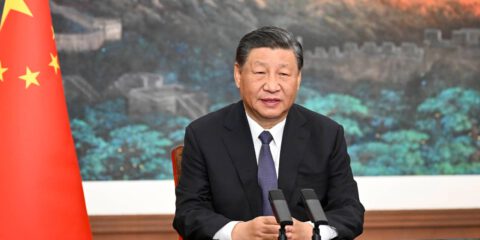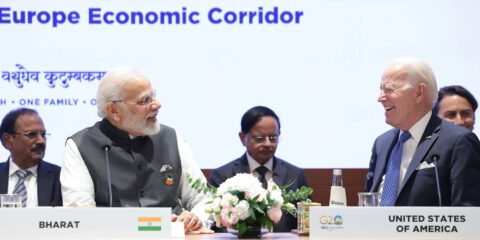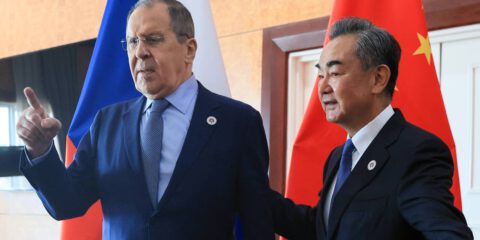China’s recent initiatives for global security – including its mediation in the Saudi-Iran rapprochement and offering a position paper for a solution in Ukraine – demonstrate the strengthening of ties with Russia, and its outreach both to Europe and countries of the ‘Global South’ that would prefer to avoid aligning with the West on geopolitical issues. Hence, it is essential to delve deeper into the detailed “Global Security Initiative” to understand China’s vision for its preferred world order and the accompanying roadmap to get there. This article analyzes this initiative.
Introduction
China has significantly accelerated its recent diplomatic efforts vis-à-vis Europe, the Middle East,[1] and the ‘Global South’ (what used to be called the Third World, or the world’s developing nations). One reason is China’s internal political calendar. After Communist Party of China (CPC) General Secretary and Chinese President Xi Jinping’s selection for an unprecedented third term in October, the lifting of COVID restrictions in December, and the holding of the ‘Two Sessions’ in March, where he promoted his protégés to the top positions of the state and further solidified the party’s control of the government, Xi turned his attention to diplomacy. Another reason is the first anniversary of the war in Ukraine and China’s desire to strengthen ties with Russia as a counterweight to the US and its allies while at the same time signaling to Europe and the developing world that there is an alternative to American claim for global leadership.
Since Russia invaded Ukraine in February 2022, China has been unable to square the circle of supporting Russia rhetorically and economically (though not yet militarily) while at the same time maintaining positive relations with the West, especially against the backdrop of China’s own slowing economy. It finds itself in a dilemma: Russia is the only significant ally of China, one that sees eye to eye with Beijing on the challenge that the US-led world order presents to the Chinese model. However, Europe, the US, and Southeast Asia are China’s leading trading and technology partners.
In February 2023, China issued a series of documents and position papers related to a solution for Ukraine. The ultimate purpose of these documents, on the one hand, was to paint China as a responsible broker, to change the Western narrative of Chinese support for Russia, and to try to create fissures in the Europe-US alliance. On the other, it was to present China as attempting to find a solution for Ukraine while finding favor with the Global South, which is hoping to end the war that has sent the price of food and energy higher. At first glance, these documents offer little beyond generally accepted but impossible-to-implement principles and thus can be seen as the continuation of China’s “straddle,” as manifested by Xi Jinping’s meeting with Russian President Vladimir Putin in Moscow.[2]
Most of the global attention was devoted to the “China’s Position on the Political Settlement of the Ukraine Crisis” document.[3] However, analyzing a more important Chinese document – “The Global Security Initiative Concept Paper”[4] – provides crucial insights into China’s vision for a world order more commensurate with its interests, and the tools used to advance it. This article dissects the various Chinese initiatives, especially the Global Security Initiative and its evolution. Analysis of this initiative demonstrates how Chinese diplomacy is evolving and how China begins with a general statement and gradually fills in the blanks with content. This practice is adopted with other Chinese initiatives, such as “Community of Common Destiny for Mankind,”[5] the Belt & Road Initiative, and others.
The Imaginary Mediator: China’s Global Security Initiative Aims at Healing Rifts with Europe
China began a flurry of diplomatic activity in February. China’s top diplomat, Wang Yi, addressed the Munich Security Conference on February 18,[6] when he attempted to present China as a responsible stakeholder offering a solution to Europe’s gravest crisis since 1945. Wang also promised to issue a detailed document presenting China’s Global Security Initiative, and a document on the Ukraine crisis to support peace talks. Wang stood at the heart of the European consensus on Ukraine, bemoaning the lack of trust between superpowers, the Cold War mentality, and the separation into political blocks. These are China’s strategic interests. Wang said that peace and development go hand in hand, that the US is trying to suppress China’s rise, and even blamed “certain forces that aren’t interested in promoting peace talks and don’t want the fighting to stop,”[7] hinting at the US.
| February 18 | Wang Yi’s Speech at the Munich Security Conference |
| February 20 | The ‘US Hegemony and Its Perils’ document |
| February 21 | The ‘Global Security Initiative Concept Paper’ |
| February 21 | FM Qin Gang’s speech on the ‘Global Security Initiative’ publication |
| February 24 | China’s ‘Position on the Political Settlement of the Ukraine Crisis’ document |
| February 26 | The China Daily’s editorial: “EU should keep its distance from US” |
CPC Politburo member Wang Yi, director of the Office of the Central Commission for Foreign Affairs who succeeded Dai Bingguo and Yang Jiechi in that role, visited France, Italy, Hungary, and Russia from February 14 to 22.[8] The visit passed through countries more amenable to China and less critical of Russia. In his visit to Russia, Wang told Russian Foreign Minister Sergei Lavrov that relations between the two powers will continue “the positive trend,” no matter “how the international situation changes.” That was part of balancing Europe in preparation for Xi Jinping’s visit to Moscow on March 20-21.[9]
Before the release of the two documents above promised by Wang, the Chinese Foreign Ministry published a paper on February 20 titled “US Hegemony and Its Perils.”[10] The document rehashes China’s sharp criticism of American military and economic hegemony. But it also takes pains to emphasize that China behaves differently by not interfering in the internal affairs of other countries, and as such, is aimed at the developing world that is less enthusiastic about Western support of Ukraine. On February 21, the Foreign Ministry published the detailed “Global Security Initiative Concept Paper,” and on the same day, Foreign Minister Qin Gang repeated the main points at a special forum while warning that “world security would not be possible without the security of China.”[11]
On February 24, the Foreign Ministry published China’s ‘Position on the Political Settlement of the Ukraine Crisis.’ The document elaborates China’s position in 12 points, summarizing its interests in the conflict: respect of sovereignty, cease of hostilities, indivisible security, no to block formation, no to sanctions, a more central role for the UN, and other general slogans. To drive the message home, the official English-language China Daily published an editorial on February 26 titled, “EU should keep its distance from the US so it can work with Beijing for peace.”[12] The editorial claims that China’s position paper on Ukraine demonstrates its neutrality, and positions it as an honest broker and a responsible stakeholder. The EU, China Daily wrote, “should value China’s neutrality, just as China cherishes the bloc’s strategic independence from the US over Sino-EU relations.”
The Global Security Initiative
To understand China’s recent moves, we must carefully examine the development of the ‘Global Security Initiative,’ together with additional documents published by China, for insights into its foreign policy goals. Xi Jinping first proposed the ‘Global Security Initiative’ on April 21, 2022, at the Boao Forum for Asia, China’s answer to the World Economic Forum in Davos.[13] (This followed the ‘Global Development Initiative’ proposed by Xi on September 21, 2021, in his speech to the UN). As Wang Yi wrote on April 24, 2022, “This important initiative provides a clear answer to the big question of the era – ‘what kind of a security concept the world needs and how can all countries realize common security’ – and fully demonstrates President Xi Jinping’s internationalist sentiment and great power leader’s style of caring for the cause of world peace and development, contributes Chinese wisdom to closing humanity’s peace deficit, and provides a Chinese solution to international security challenges.”[14]
The Global Security Initiative is a response to problems inherent in the current US-led international order, as China sees it, namely Cold War mentality, the creation of exclusive political blocks and groupings, implementing double standards under the guise of “rules of the game,” hegemonistic behavior under the name of democracy, etc.[15] China ties the Ukraine crisis with the problems most concerning countries of the Global South – the rise in food and energy prices. The way China sees it, its Global Security Initiative “discards the Western geopolitical security concept and transcends it.”[16] Since “a peaceful international environment is a precondition for development,” the initiative is an attempt to create a safe environment for China’s development.
The Global Security Initiative contains six general principles:
- Common, comprehensive, and sustainable security
- Respecting the sovereignty and territorial integrity of all countries
- Abiding by the purposes and principles of the UN Charter
- Taking the legitimate security concerns of all countries seriously
- Peaceful resolution of conflicts
- Maintaining security in both traditional and non-traditional domains.
The fourth principle includes the concept of “indivisible security.” This concept was first mentioned[17] in the Helsinki Accords in 1975 (which were the basis for establishing the Organization for Security and Cooperation in Europe). It appeared later in other agreements signed between Russia and Europe and NATO.[18] This is also the recurring complaint of Russia regarding NATO’s expansion to the east, both before and after the invasion of Ukraine.
In Vol. 4 (July-August) of International Studies, the journal of the China Institute of International Studies (CIIS), a think tank under China’s Foreign Ministry, two scholars explain China’s proposed reform in global security governance.[19] The article is the fullest elaboration of the Global Security Initiative (until the publication of the entire concept paper this year). The authors add details that would appear later in the final document. For instance, China actively advocates bodies such as G20, Shanghai Cooperation Organisation (SCO), The Asia-Pacific Economic Cooperation (APEC), and BRICS (Brazil, Russia, India, China, South Africa).
In recent years, China has repeatedly raised its ideas for global governance reform.[20] The demand for a global architecture more commensurate with China’s interest has appeared under previous leaders as well, but since Xi Jinping came into power in 2012, demand for reform of global governance, including security governance, has become more explicit.[21] For example, Xi called for a “New Asian Security Concept” in May 2014 at the Conference on Interaction and Confidence-Building Measures in Asia (CICA) in Shanghai.[22] The term “reform in global security governance system” has also appeared several times, for instance in Wang Yi’s speeches even before the war in Ukraine, but without further details.[23]
The focus of the Global Security Initiative is the international environment of the developing world and Asia. For example, CIIS President Xu Bu writes, “The peaceful development of China begins in Asia, depends on Asia, benefits Asia. China resolutely supports peace in Asia, actively promotes cooperation in Asia, and jointly promotes the unity of Asia.”[24] The CIIS scholars emphasize in their International Studies article that the Global Security Initiative is China’s response to the systemic challenge presented by the US and its allies. Since the Biden administration came to power, the US approach changed from a competition between countries (within one system) to a competition between different systems with ideological characteristics as the US develops “values diplomacy” and sees China as its pacing challenge.
The Global Security Initiative Concept Paper
The full Global Security Initiative Concept Paper published in February fully develops the six general principles and adds details not included in Xi Jinping’s original speech last year. For instance, the call to “uphold the international system with the UN at its core, the international order underpinned by international law and… the UN Charter; …the UN’s… status as the main platform for global security governance” is an obvious direct criticism of the US-led “rules-based” order. So is the call to support UN efforts to prevent conflict and peacekeeping efforts, in general, and especially in Africa.
It is clear that the document is intended to showcase China’s concern for the problems troubling the Global South, and a large part of the document is dedicated to Africa and Asia. The Middle East is also mentioned in the paper – China supports a stronger Arab League and seeks to advance a two-state solution to the Palestinian question. There is also a new demand: “to convene a larger, more authoritative and more influential international peace conference, so as to achieve a just solution to the Palestinian question at an early date.” Regarding the players to promote these efforts, China is predictably emphasizing the UN and other organizations where it has a leading role: the SCO, the BRICS, CICA, the “China + Central Asia” mechanism, and others. Another new suggestion is to hold “high-level conferences” on the initiative “to strengthen policy coordination and communication to address security challenges.” In other words, China aims to create an alternative to the Munich Security Conference to promote its vision of world order.
Summary
While it is unlikely that China’s initiatives can provide a real solution to the Ukraine crisis, they should not be dismissed out of hand. Many countries in the developing world are not eager to join in Western sanctions on Russia. They view the war as a problem of the West and see themselves as the primary victims of rising food[25] and energy prices. Even India, a member of the Quadrilateral Security Dialogue (QUAD), together with the US, Japan, and Australia and the host of this year’s G20 meeting, does not want to consider additional sanctions[26] on Russia and is not even willing to include the word “war” in the G20 documents.[27] A survey conducted by the European Council on Foreign Relations (ECFR) in late 2022 and early 2023 demonstrates the split between the EU- and NATO-centered West and countries such as India, Turkey, and China, whose populations see the war as leading to a new multipolar world and are unwilling to choose sides in the war in Ukraine.[28]
China is expending considerable efforts to woo the Global South, and its Global Security Initiative is aimed at helping it in these efforts across the developing world. The pilgrimage[29] by European leaders to Beijing after Xi Jinping visited Moscow, and the success of the Chinese mediation between Saudi Arabia and Iran, prove that China is making progress in advancing its vision for a world order more commensurate with its interests. China is likely to continue in this direction.
[1] https://www.fmprc.gov.cn/mfa_eng/wjdt_665385/2649_665393/202303/t20230311_11039241.html
[2] https://edition.cnn.com/2023/03/22/europe/china-xi-russia-putin-talks-five-takeaways-intl-hnk-mic/index.html
[3] https://www.fmprc.gov.cn/mfa_eng/zxxx_662805/202302/t20230224_11030713.html
[4] https://www.fmprc.gov.cn/mfa_eng/wjbxw/202302/t20230221_11028348.html
[5] https://chinamediaproject.org/the_ccp_dictionary/community-of-common-destiny-for-mankind/
[6] https://www.fmprc.gov.cn/mfa_eng/zxxx_662805/202302/t20230219_11027215.html
[7] https://www.fmprc.gov.cn/zyxw/202302/t20230218_11027045.shtml
[8] https://www.fmprc.gov.cn/mfa_eng/xwfw_665399/s2510_665401/2511_665403/202302/t20230213_11024546.html
[9] https://edition.cnn.com/2023/02/22/china/china-wang-yi-moscow-ukraine-intl-hnk/index.html
[10] https://www.fmprc.gov.cn/mfa_eng/wjbxw/202302/t20230220_11027664.html
[11] https://www.fmprc.gov.cn/mfa_eng/wjb_663304/wjbz_663308/2461_663310/202302/t20230222_11029589.html
[12] https://www.chinadaily.com.cn/a/202302/26/WS63fb3dbca31057c47ebb0e8b.html
[13] https://english.news.cn/20220421/f5f48ba605ed427dab911188af175ebf/c.html
[14] https://www.mfa.gov.cn/wjbzhd/202204/t20220424_10672812.shtml
[15] Ibid.
[16] Ibid.
[17] https://www.osce.org/files/f/documents/5/c/39501.pdf
[18] https://www.ft.com/content/84a43896-2dfd-4be4-8d2a-c68a5a68547a
[19] http://cn.chinadiplomacy.org.cn/2022-08/25/content_78388606.shtml
[20] http://www.qstheory.cn/qshyjx/2021-04/26/c_1127376352.htm
[21] https://www.brookings.edu/research/network-power-chinas-effort-to-reshape-asias-regional-security-architecture/
[22] https://www.fmprc.gov.cn/mfa_eng/wjdt_665385/zyjh_665391/201405/t20140527_678163.html
[23] http://world.people.com.cn/n1/2022/0126/c1002-32339689.html
[24] http://paper.people.com.cn/rmrb/html/2022-08/30/nw.D110000renmrb_20220830_1-11.htm
[25] https://geopoliticalfutures.com/food-inflation-on-the-rise/?fbclid=IwAR2tIampW8nBzXFRfJuWv_g4Cnxw7nn1-HgVREOUM5qIgnrdSPj9Gf0DZGo
[26] https://economictimes.indiatimes.com/news/economy/policy/host-india-does-not-want-g20-to-discuss-more-sanctions-on-russia/articleshow/98148388.cms
[27] https://financialpost.com/pmn/business-pmn/g-20-host-india-resists-calling-russias-war-a-war
[28] https://ecfr.eu/publication/united-west-divided-from-the-rest-global-public-opinion-one-year-into-russias-war-on-ukraine/
[29] https://www.nytimes.com/2023/03/23/world/europe/spain-sanchez-china-xi-ukraine.html
JISS Policy Papers are published through the generosity of the Greg Rosshandler Family.
Photo: IMAGO / Xinhua







 - בניית אתרים
- בניית אתרים